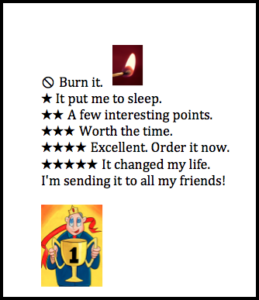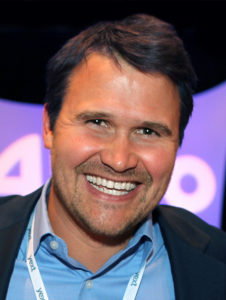CodeX Book Club, Chapter 9: The Martian
In this episode of the CodeX Book Club, Dan Lear—director of industry relations at Seattle-based Avvo—reviews “The Martian,” by Andy Weir. The movie, starring Matt Damon, just won the Golden Globe for Best Comedy. Lear’s review focuses on the lessons learned from “The Martian” that lawyers can apply to improve their practices and lives. -Monica Bay

DAN LEAR
★★★★★ The Martian: Mindfulness, Science and “What if?” on Mars
I wish I could say that I knew about “The Martian” before “The Martian” was cool. But I can’t. It further offends my inner hipster to admit that I was inspired to buy the book only after hearing that it was apparently good enough to be made into film. (In case you’ve been hiding under a rock, the movie directed by Ridley Scott, distributed by 20th Century Fox, and starring Matt Damon had wide release on October 2, 2015 and grossed more than half a billion dollars.) And all this despite a positive book review I heard on NPR.
Either way the book is fantastic. Written by self-proclaimed geek, Andy Weir, the story of his character, Mark Watney, on the desolate yet somehow mysterious Martian landscape is exciting, largely scientifically accurate, fun, funny and, it turns out, educational. Even for lawyers.
TAKE TIME TO THINK
One of Watney’s common refrains in the book is “I need to think.” Often he says these words when something’s just happened that will almost certainly mean Watney will die a quick, cold, lonely and possibly painful death on Mars. In the direst of circumstances when he literally has only minutes or even seconds instead of losing his cool Watney takes time to think and, without giving too much away, always seems to figure a way out of his predicament.
I don’t know if Weir intended for his book to be an allegory about the importance of mindfulness in our increasingly fast-paced world or if he was simply being a bit patronizing by underscoring the fact that successful smart scientists and engineers must take time to think regardless of their circumstances. Regardless, Watney’s frequent pauses —and the ideas born from them—are a powerful reminder that taking time to think is an indispensable problem solving tool.

This need to pause has big implications for lawyers in their work life. Lawyers live and die by the billable hour constantly trying to squeeze as many six-minute blocks out of the day as possible. Lawyers who take time to step back will not only enjoy better mental and physical health but they will also possess the valuable perspective that comes only from taking a step back every once and a while.
Incessant parsing of days into six-minute increments is only the beginning. The high-stakes subject matter of private law practice is stressful enough but most lawyers must build a book of business and manage their firms. It’s no wonder that substance abuse is a significant problem in the profession. Pausing can help here too. There’s now a raft of evidence that mindfulness is an effective and powerful tool to fight stress and the maladies that accompany it. Some forward thinking people are working hard to bring it to law. With law schools such as the University of California Berkeley Law School developing programs around mindfulness, and experts on mindfulness in law like my friend Jeena Cho (The Anxious Lawyer) getting exposure on national stages, the power of the pause in law is increasingly evident.
SCIENCE IS COOL!
“The Martian” has also been highly praised as a work of “hard” science fiction. Hard science fiction is a category of science fiction characterized by an emphasis on scientific accuracy, technical detail or both. Much of what makes “The Martian” so compelling is that Watney’s solutions to his problems don’t come in the form of some futuristic technological deus ex machina, but instead rely upon science based in the reality that we all know.
Doing things this way, “The Martian” makes science cool. Many lawyers went to law school not only because they didn’t think science or math was cool. While this kind of attitude was not career limiting in decades or workforces past, science—and particularly math—are creeping into each and every discipline. Law is no exception. Lawyers who avoid or, even worse, jokingly laugh off their scientific or mathematical ineptitude are openly declaring their incompetence to function in tomorrow’s workforce or to represent tomorrow’s client.
ASK: WHAT IF?
Perhaps most compelling is how Weir came to write “The Martian”—and how the book went from a self-published blog to a hardcover book that was sold as a Hollywood movie. Passionate about space travel Weir began the novel to imagine what a mission to Mars that used only today’s technology would look like. He was repeatedly turned down by traditional publishers so Weir self-published the novel on his own website, one chapter at a time. For free. The novel quickly gained popularity so he self-published it on the Amazon Kindle, making it available for the lowest price possible, 99 cents.
After the book became a best-seller on the Amazon Kindle, Crown Publishing Group (a subsidiary of Penguin Random House) bought the rights and Twentieth Century Fox bought the film rights shortly thereafter. Weir has joked that the whole process felt a bit surreal. As he said in an interview in the Wall Street Journal: “I keep thinking, is this some kind of long-term scam or con that someone’s running on me?” But it’s not and his story has gone from self-published web phenomenon to “starring Matt Damon” in just few short years.
It all started with with a question: “What if I wrote a story that described a trip to Mars using today’s technology? It all started with a “what if?”
Lawyers say “what if” a lot—but in a worst-case-scenario. This may be helpful for lawyers when advising their clients about how things could go horribly wrong in a given situation, but it’s not particularly useful for lawyers when trying to build a law firm or use technology to enhance or reinvent their practices or services.
Lawyers who aspire to grow their practices and deliver legal services differently could learn from Andy Weir. They could, for a brief moment, stop focusing on the doom and gloom of a given course of action and instead ask “what if?” They could imagine, “how could I get my practice from where it is to this seemingly impossible destination using only what I have?” While the type of success that Weir has experienced with “The Martian “is not guaranteed nor even likely there’s much that lawyers will learn from asking “what if?” and then allowing themselves to answer.
Inspiration can come from the most unlikely—and, even though my inner hipster might resist—most commercial of places. Lawyers who follow the book’s lead, who take time to think, who embrace science and particularly math, and who ask “what if” won’t make it to Mars but they’ll certainly find uncharted and exciting territory.
Click here for movie trailer.

Dan Lear is director of industry relations at Avvo, and is an attorney, legal innovator, facilitator and blogger. He is co-founder of Seattle Legal Innovation and Technology MeetUp. Linkedin: https://www.linkedin.com/in/danlear. Twitter: @rightbrainlaw.
Monica Bay is a Fellow at CodeX and a freelance journalist with Bloomberg BNA Big Law Business and Above The Law. She is a member of the California bar. Twitter: @monicabay. If you are interested in reviewing a book, ping me at mbay@codex.stanford.edu.
Updated 07-15-16 to correct byline. – M.B.
